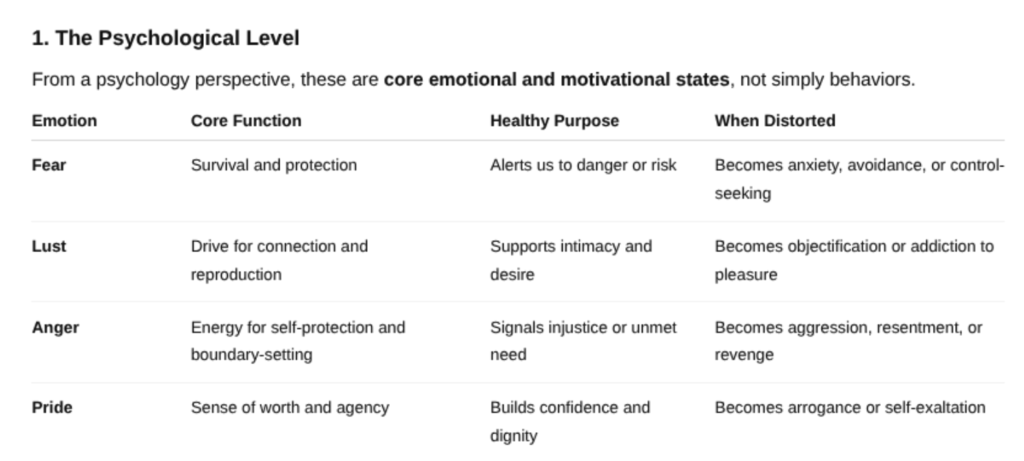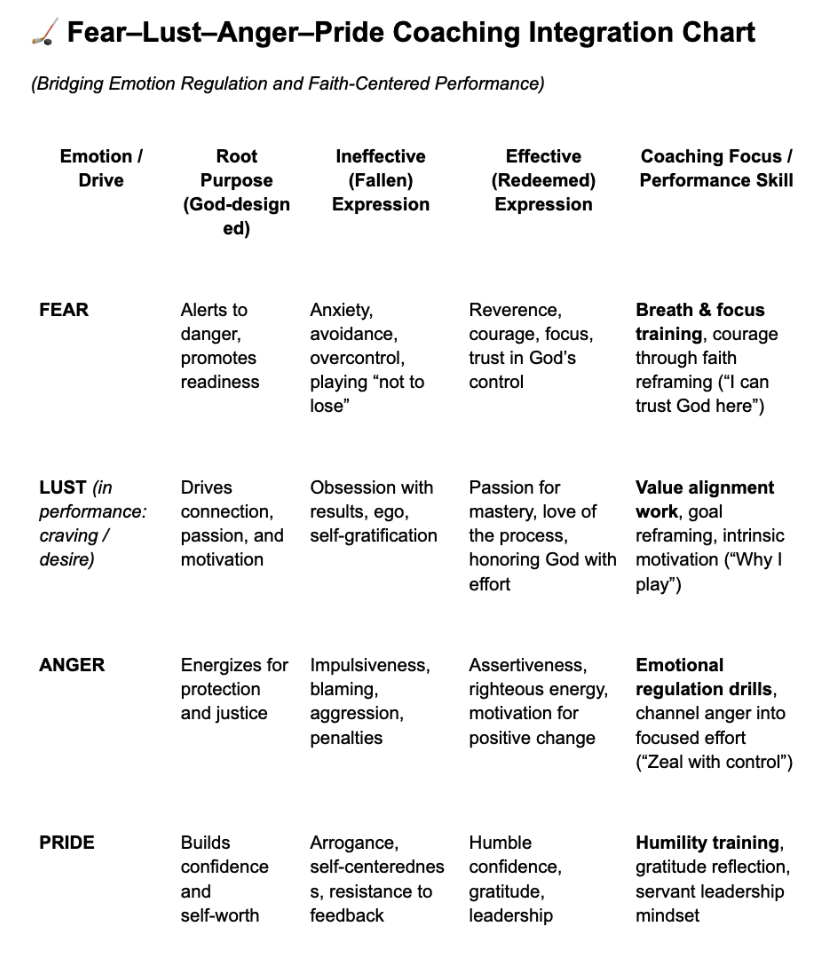Every Christian leader faces valleys.
Table of Contents
Moments when vision feels foggy, pressure mounts, and confidence quietly slips away. Peaks test your performance, but valleys test your character.
And in those valleys, where strategy can’t fix what only surrender can, you’ll meet the four internal forces that determine whether you rise or stay stuck:
Fear, Lust, Anger, and Pride.
Together, they form what I call your FLAP.
These are not random emotions; they’re spiritual patterns that reveal where your trust, identity, and leadership truly rest.
Managing your FLAP isn’t just about personal growth. It’s about organizational wholeness, because whatever leads you internally eventually leaks externally into your brand, your culture, and your marketing.
As goes the leader, so goes the message.
1. Fear, The Silent Saboteur of Vision
“Fear and faith are equal but can’t live simultaneously in your thoughts.” – Henry Wright
Fear is more than anxiety, it’s a false prophecy that predicts failure and demands belief.
It’s the inner voice that says, “You’re not capable… You’re too late… It must be perfect.”
Fear tells us we must control outcomes.
Faith tells us to trust God’s timing.
Isaiah 41:10 reminds us,
“Fear not, for I am with you; be not dismayed, for I am your God. I will strengthen you.”
As a Christian leader, fear often hides behind strategy:
- The fear of losing reputation, donors, or people.
- The fear of making a wrong decision.
- The fear of being truly seen.
When fear drives leadership, creativity dies.
Your organization becomes reactive instead of visionary.
Your marketing becomes manipulative instead of invitational.
Faith restores freedom.
Faith declares that God is already in the future you’re worrying about.
Post His promises in your office. Speak them over your plans. Let your team hear faith in your tone. Because fear is contagious, but so is faith.
2. Lust , The Desire That Distorts Purpose
“Loving people means caring without an agenda.” – Bob Goff
Lust isn’t limited to sexual desire. It’s any craving for control, attention, or affirmation that replaces our dependence on God.
In leadership, lust takes many forms:
- The lust for recognition.
- The lust for success.
- The lust for power or platform.
Henry Wright called lust “the weakening of the will.” It entices us to meet our own emotional needs at the expense of others.
When lust runs unchecked in leadership, ministry becomes marketing and people become props. The brand starts serving the leader instead of the mission.
But there’s a better way.
The opposite of lust isn’t restraint, it’s love.
Love gives what lust takes.
Love serves without agenda.
Love shifts focus from what I need to how can I give.
If lust fuels performance, love fuels presence. When you love the people you lead and serve, your marketing becomes ministry, authentic, generous, and transformational.
3. Anger, The Energy of Unresolved Expectation
Anger is often just pain with armor on.
It’s the emotion leaders least want to admit, yet it quietly shapes culture.
The Apostle Paul warns in Ephesians 4:26-27,
“Be angry and do not sin; do not let the sun go down on your wrath.”
Henry Wright described anger as one stage in the “family of bitterness”:
Unforgiveness → Resentment → Retaliation → Anger → Hatred → Violence → Murder.
Anger is the midpoint in a downward spiral that kills creativity and connection.
Andy Stanley once said, “People who are angry are really saying, ‘You owe me.’”
That’s true in leadership. Angry leaders feel someone has taken something from them, respect, loyalty, or opportunity, and they subconsciously demand repayment.
The only cure is forgiveness.
Forgiveness doesn’t excuse behavior; it frees your spirit.
It tells your organization that failure isn’t fatal here.
When Tom Watson Sr., founder of IBM, had an executive lose $10 million, the young man offered to resign.
Watson replied, “You can’t be serious, we just spent $10 million educating you.”
That’s what grace looks like in leadership.
And grace, not anger, builds healthy culture.
4. Pride , The Most Sophisticated Sin in Leadership
“Pride goes before destruction, and a haughty spirit before a fall.” – Proverbs 16:18
Pride is the sin that smiles. It cloaks itself in confidence, competence, and even spirituality.
Henry Wright called it a “fraudulent existence,” appearing holy while hiding brokenness.
In leadership, pride manifests as:
- Defensiveness to feedback
- Refusal to admit weakness
- Overconfidence in human strategy
- The need to appear “always right”
Pride isolates leaders. It blocks correction and corrodes authenticity.
The proud leader says, I must protect my image, while the humble leader says, I must protect the mission.
The cure? Humility.
Humility doesn’t mean self-deprecation. It means obeying God and serving others without keeping score.
It’s letting others shine, even when it threatens your ego.
Andy Stanley offers this challenge:
“Go out of your way to celebrate publicly the things that threaten you privately.”
That’s leadership maturity, honoring others while crucifying pride.
Because God resists the proud but gives grace to the humble.
And grace is the currency of influence.
5. Why Your FLAP Shapes Your Leadership Identity
Your FLAP is not your flaw, it’s your feedback.
It reveals what still competes for your trust in God.
- Fear exposes what you don’t believe He’ll handle.
- Lust reveals what you’re trying to control.
- Anger shows where you haven’t healed.
- Pride uncovers where you’ve stopped growing.
As leaders, our organizations mirror our inner life.
You can’t market peace if you lead from anxiety.
You can’t preach love if you operate from control.
You can’t inspire trust if you secretly crave validation.
Managing FLAP aligns your soul with your story.
When your heart is healthy, your leadership becomes believable.
Your message feels authentic.
Your marketing becomes a mirror of God’s redemptive work in you.
- Managing Fear brings clarity.
- Managing Lust refines motive.
- Managing Anger rebuilds trust.
- Managing Pride sustains humility.
That’s how leaders become storytellers of wholeness, not performers of perfection.
6. From Valley to Vision
The valley seasons aren’t punishments; they’re promotions in disguise.
They reveal whether your leadership identity is built on ego or endurance.
Henry Wright once said, “We don’t get rid of fear; we manage it.”
The same is true of every part of FLAP.
You’ll face these emotions repeatedly, but they don’t have to rule you.
The Holy Spirit invites a daily exchange:
- Replace fear with faith.
- Transform lust with love.
- Heal anger with forgiveness.
- Exchange pride for humility.
Each exchange reshapes identity and rewires your leadership culture.
7. Leading the Way of Wholeness
The world doesn’t need more clever Christian marketing. It needs whole Christian leaders, men and women whose message flows from healed hearts.
Your FLAP is not the enemy; it’s the invitation.
It’s God’s way of saying, “I want to form something deeper in you.”
Perfect love doesn’t just cast out fear, it heals lust, softens anger, and humbles pride.
When you manage your FLAP through faith, love, forgiveness, and humility, your organization becomes a living testimony of grace.
And grace, when lived authentically, is the most powerful marketing message there is.
Managing your FLAP is not self-help, it’s spiritual formation for leadership.
The way you manage it determines the kind of legacy you leave.












